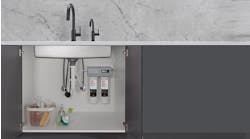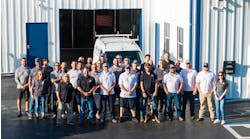Latest from Residential Plumbing
Sponsored
Water heater standards: stay ahead of the curve
As CONTRACTOR magazine has reported previously, new water heater efficiency standards will be implemented in less than a year. That means it’s time for plumbers and contractors to evaluate the effects these changes will have on their business, and adequately prepare.
In April 2015, the U.S. Department of Energy (DOE) will put into effect a new energy efficiency standard for residential water heaters that will require all water heaters to be more efficient — the required energy factor (EF), based on the hot water produced per unit of fuel and other factors, for gas-fired, oil-fired, electric, tabletop, instantaneous gas-fired, and instantaneous electric water heaters will become more stringent, and it will most likely affect your business.
Doing the proper research on the new standard and taking steps to understand how it applies to the industry and your business is important. The legislation will require plumbers and contractors to be more cognizant of energy factor ratings and the efficiency of certain types of heaters —because often, plumbers will be the go-to resource for information about the standards.
Water heater manufacturers are ready for new residential efficiency standards
The changes will also spur new product introductions — water heaters utilizing novel, energy-efficient technology will come to market that you’ll need to be knowledgeable about.
How can you stay ahead of the curve?
Educate your employees and customers
Most consumers are unaware of the amount of energy their water heaters are consuming — the water heater is the second single-biggest, energy-consuming appliance in their home1, behind the HVAC system. The new legislation is an opportunity for you to educate customers on the benefits of purchasing and installing a more efficient appliance.
Arming your employees with the information they need to understand and communicate the new standards will be critical. With a thorough understanding of the legislation, they’ll be able to educate clients with accuracy and confidence, and will be able to make solid recommendations.
An efficient water heater can bring long-term cost and energy savings to your clients, and that’s a major selling point. Additionally, the new legislation is expected to have far-reaching impacts across the U.S., and is anticipated to:
- Save approximately 3.3 quads of energy, which is equivalent to 45 coal-fired power plants.
- Result in approximately $63 billion in energy bill savings for products shipped from 2015-2044.
- Avoid about 172.5 million metric tons of carbon dioxide emissions; equivalent to the annual greenhouse gas emissions of about 33.8 million automobiles.
- Decrease energy usage of large electric water heaters by 47%.
For easy reference, GE Appliances published a fact sheet and infographic that break down the need-to-know information about water heaters and the new legislation.
Research product options
Knowing which water heaters on the market fit the criteria set by the new legislation is an important preparation. For instance, heat pump technology is currently the only option capable of meeting the heightened efficiency requirements for electric water heaters larger than 55 gallons.
GE’s GeoSpring electric heat pump water heater is currently available in 50-gal. capacity and will be available in 80-gal. capacity in January 2015. The current 50-gal. model already exceeds the 2015 standards for energy efficiency. It is ENERGY STAR-qualified — with an Energy Factor of 2.4 and a first-hour delivery of 65-gal. — fits in a similar footprint as a standard 50-gal. unit and uses top water and electrical connections.
Stay informed on new products or technologies, and how those products stack up against the competition. Often companies offer energy-efficient product training. For example, GE offers training on the GeoSpring in conjunction with the plumbing wholesalers who carry the water heaters. Having knowledge that allows you to recommend viable solutions for your customers can go a long way for your business. Continue to read and research options, attend trainings and don’t be afraid to try new models.
Know what your clients are looking for
Customers can be averse to change and may push back; a more stringent standard may not be the most enticing incentive to upgrade their appliances. A clear understanding of the benefits these can bring to the home might help.
Prepare some selling points. Cost is often a major factor in the decision to purchase a new water heater, so make sure your clients are aware of the cost-savings that can be had over time with an energy-efficient model. Consumers can save via reduced energy bills, as well as through a variety of rebates offered for purchasing energy-efficient appliances.
Manufacturers and utilities offer rebates on efficient water heaters, including the GeoSpring. These rebates help reduce the initial cost of the water heaters and can be beneficial in selling the product to your clients. GE offers a tool online called Rebate Finder, where you plug in your zip code to see available rebates in the area.
The GeoSpring can help homeowners save $365 annually on their electric bills versus a standard electric water heater. It uses 62% less electricity and typically pays for itself in less than three years, making it a favorable option for consumers looking for an energy- and cost-efficient product. According to GE, a consumer can save over $3,000 in a 10-year span.
Your reputation is reflected by your industry knowledge and the products you recommend. Knowing the impacts of this new legislation, and being armed with a list of compliant products to recommend, will go a long way.



